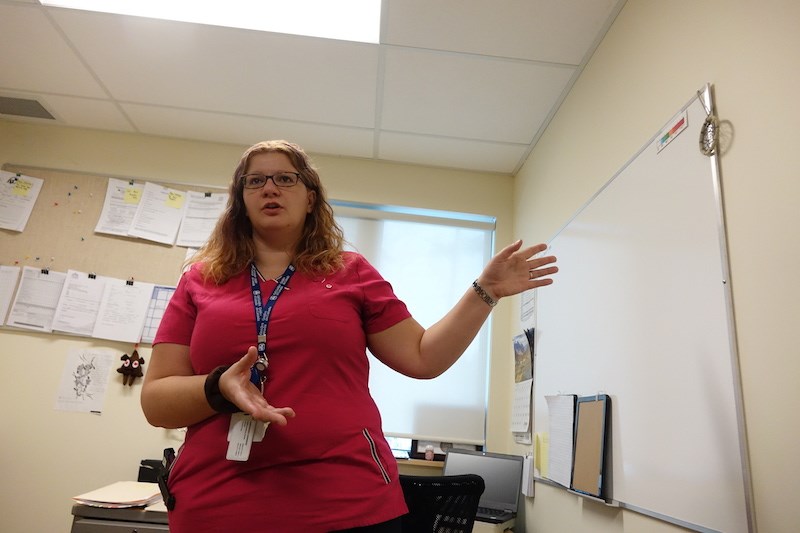People in Thompson and the north seeking treatment for their addictions now have the option of the rapid access to addictions medicine (RAAM) clinic at the Addictions Foundation of Manitoba (AFM) building on Princeton Drive, which celebrated its official opening Oct. 18.
The clinic is one of five planned for the province. Two have opened in Winnipeg in the past two months and another opened Thursday in Brandon, with one in Selkirk slated to open later this year. Funded by $1.237 million from Manitoba Health, Seniors and active Living, the RAAM clinics are designed to help patients navigate between addictions medicine specialists, primary care providers and community supports and are usually staffed by an addictions physician as well as clinicians, counsellors and outreach workers.
“People have been finding us since we started putting the doors open,” says AFM northern director Giselle DeMeulles, though they haven’t advertised their services so far. Right now, the clinic is open for a few hours on Tuesday mornings and Thursday afternoons. “We know that realistically were going to have to expand those hours.”
“In many countries around the world including Canada, more and more people are struggling with addictions and unfortunately Thompson is not immune to that global trend,” said Thompson MLA Kelly Bindle at the opening ceremony. “The rise in the use of methamphetamines, opioids and alcohol in our province have taken many Manitobans’ lives and destroyed countless families. Rapid access to addictions medicine clinics have been in operation in Ontario and they have proven successful in reducing wait times for people seeking treatment for addictions and we expect to see the same successes here in Manitoba.”
The clinic is a collaboration between the health authority and the AFM Eaglewood clinic, says Shannon Guerrero of the Northern Regional Health Authority, who appeared at the opening on NRHA CEO Helga Bryant’s behalf.
“People who suffer from addictions will be provided with quick and appropriate access to the treatment that they seek,” she said. “We hope to help in their journey of recovery.”
Nurse Mary Beaudry is the first point of contact for people seeing addictions treatment through the RAAM clinic in Thompson. She may refer them to a doctor or a counsellor or direct them into medical treatment. Because the AFM has a six-bed withdrawal management unit, she also has the option of getting them into treatment there.
“I can bring them down there if need be but I’ve been full,” she said. “That unit has been at capacity since the middle of August.”
Most of the people she sees in Thompson are seeking help with addictions to alcohol or crack and cocaine.
“I’ve had one meth and one morphine injecting,” she said, noting that methamphetamines are not yet as big a problem as they are in southern Manitoba. “It’s not that bad here but it’s here.”
On the day the clinic opened, Beaudry had a opiate-injection patient due to be admitted to the withdrawal management unit for opiate-replacement therapy, which involves administering a drug called suboxone, a pill that dissolves under the tongue.
For alcohol in particular but also cocaine, medical treatment includes the use of a drug called naltrexone.
“It really nullifies the cravings,” says Beaudry and has unpleasant side effects for addicts who drink or use while taking it. “It will make you violently sick.”
Naltrexone is expensive – $200 a month for three to six months – but treaty medical and social assistance medical plans cover it and coverage can usually be arranged for other patients as well.
DeMeulles says the withdrawal management unit and residential treatment programs have been more than 90 per cent full recently and patients may have to go on wait lists that currently stretch as far as February. Treatment for alcoholism goes for at least 28 days and for other drugs people may need residential treatment for a few months.
AFM board of governors member Clint Saulteaux, a recovering addict, said the clinic can be the difference between life and death.
“At one time I was really caught up in a very powerful grip a death grip in fact of addiction and it makes me happy to be alive today,” he said. “We know this is going to save lives. We live in a society where the addicts need to be pushed aside and not dealt with. This is taking the opposite approach. This is the most humanitarian thing that we as a society can do.”




